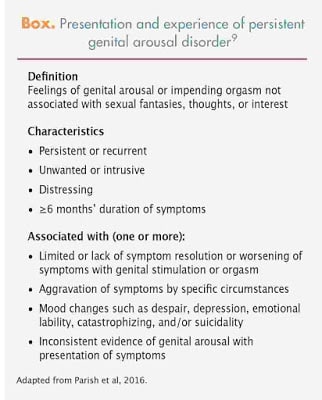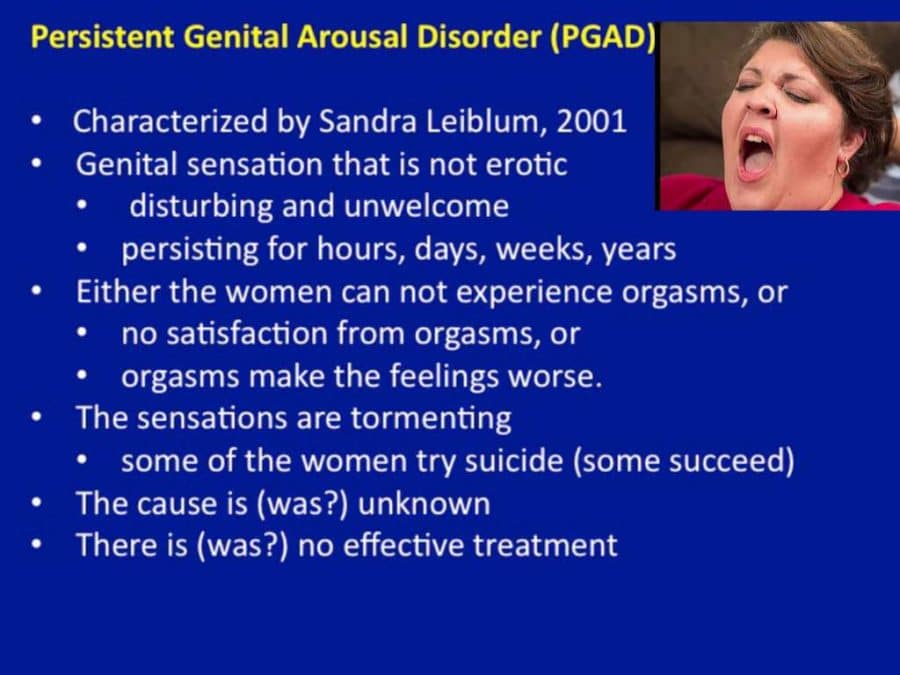
PGAD can lead to ongoing physical pain, stress, and psychological difficulties due to an inability to carry out everyday tasks. The condition can affect women of all ages.
Persistent Genital Arousal Disorder Symptoms (PGAD)
The sufferer might have a throbbing or tingling feeling in her genitals, increased blood flow to the area, or vaginal contractions. Some women with PGAD have spontaneous orgasms. But none of these symptoms is triggered by a sexual situation.
They include:
- clitoris,
- labia,
- vagina,
- perineum,
- and anus.
And it often leads to:
- wetness
- itching
- pressure
- burning
- pounding
- pins and needles
The condition can lead to psychological symptoms due to the persistent discomfort and impact on day-to-day living.
These may include:
- Stress and anxiety can also cause or aggravate symptoms.
- panic attacks
- depression
- distress
- frustration
- guilt
- insomnia
People with chronic, or incurable, persistent genital arousal disorder believe there needs to be more research into PGAD. But what sufferers really want people to know is that it’s a pain disorder, rather than a sexual one.
Causes Persistent Genital Arousal Disorder (PGAD)
According to the people suffering from persistent genital arousal disorder, Sexual stimulation, masturbation, anxiety, and stress can trigger PGAD. In some women, stress causes the onset of the disorder. Once the stress is alleviated, they feel relief.
However, this is not the case in every woman suffering from PGAD. Research has implied a link between PGAD and the veins, hormones, nervous system, and chemical balance after using some types of medication.
Also, there is a chance that cysts may also cause the condition. Tarlov cysts are sacs filled with spinal fluid that appear on the sacral nerve root. Sacral nerves at the bottom of the spine receive electrical signals from the brain, and they relay these instructions to the bladder, colon, and genitals.
However, a standard medication for PGAD doesn’t exist. The condition is treated with everything from anti-neuralgic medicine usually prescribed for Parkinson’s disease, too, in some cases, Botox injections. The symptoms can be calmed, but not cured, and permanent frustration can have severe effects on mental health. This creates difficulty in diagnosing and treating the disorder.
Treatment of Persistent Genital Arousal Disorder (PGAD)
PGAD cure usually centers on managing symptoms, due to the often-unclear causes of the condition and varies from person to person.
Gabapentin, a drug that eases nerve pain and was originally developed to treat epilepsy. The medication helps the person to cope with PGAD treatment, but it doesn’t relieve the symptoms entirely. “
Now, the people suffering from persistent genital arousal disorder found a great deal of relief through the use of a transcutaneous electrical nerve stimulation (Tens) machine. This device, commonly used to treat back pain, sends small pulses of electricity into the base of the spinal column. Expert says the use of this device has made them practically PGAD-free.
Women suffering from persistent genital arousal disorder can also undergo cognitive behavioral therapy , and most of them have finds out that activities such as mindfulness meditation and swimming help to keep them calm. But the underlying symptoms are unavoidable.
Prescribed medication or changes in medication can help to manage the condition.
In some cases, Changing current medications by removing drugs with herbal may be helpful. In nerve-related cases, such as a Tarlov cyst that I mentioned earlier on, the treating doctor may suggest surgery such as releasing the nerve from entrapment.
PGAD is not yet curable. However, its symptoms can be managed on an ongoing basis to improve the quality of life of people with the condition and to reduce the psychological harm of PGAD.
Recommendations For People Having Persistent Genital Arousal Disorder (PGAD)
References
- Persistent Genital Arousal Disorder (PGAD)
- sexhealthmatters
- MLA Felman, Adam. “What is persistent genital arousal disorder (PGAD)?.” Medical News Today. MediLexicon, Intl., 02 May. 2018. Web.
- 02 May. 2018. medicalnewstoday
- Eleanor Margolis. “Women with persistent genital arousal disorder: ‘People hear orgasm and they think it’s a good thing”. The Guardian,1 1 May. 2018. Web.
- 02 May. 2018. theguardian


